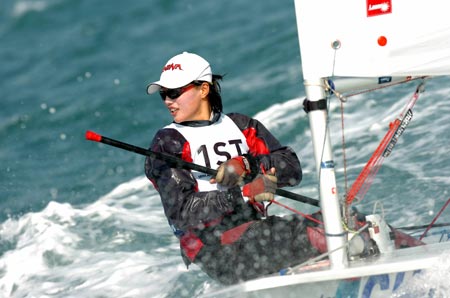In 2006, Chinese athletes recorded remarkable achievements in a series of world sports events, and breakthroughs were made in a few fields. Chinese gymnastics raked in a record eight gold medals at the World Gymnastics Championships. The Chinese women's gymnastics team won the group title for the first time, making a great breakthrough. At the World Shooting Championships, the Chinese team took five gold medals. Chinese athletes also won world titles in such events as women's tennis, men and women's canoe, men's fencing epee, women's sailing, men's Greece-Roman wrestling and women's archery.
 |
The Doha Asian Games again confirmed the dominance of China in Asian athletic sports. Pictured is Xu Lijia, the gold medal winner in the Laser Radial open class of the sailing competition.
At the Turin Winter Olympic Games, the Chinese delegation won two gold medals, four silver medals and five bronze medals. Breakthroughs were made in some of the weaker events and the medal tally at Turin exceeded that of any of previous Winter Olympics. At the Doha Asian Games, the Chinese delegation again ranked first in terms of gold medals and total medals.
In 2006, Chinese athletes won 141 world championships in 24 events. Eleven athletes and three teams set 21 world records. At the Doha Asian Games in December 2006, Chinese athletes won 165 gold, 88 silver and 63 bronze medals, with both the gold and the overall medal tallies surpassing those in previous Asian Games. This was the seventh time that the Chinese delegation ranked first in terms of gold medals.
Preparations for Beijing Olympics
Preparatory works for the 2008 Olympics in Beijing proceeded smoothly in 2006. Following the leading group and office for Olympic competition were set up in the General Administration of Sport, all individual sport centers also established their respective preparation teams consisting of sports officials of key provinces and the People's Liberation Army.
The General Administration of Sport devised the Regulations for the Management of Preparatory Works for the 2008 Olympics and the Regulations for the Management of National Teams' Preparation for the 2008 Olympics, which contain explicit stipulations on the organization, management, training and competition of national teams, as well as the requirements on information disclosure, publicity, ideological education and anti-doping works. The goal of all sports teams in the 2008 Olympics has been set.
As for urgent problems that national teams encountered in the preparation for the 2008 Olympics, in 2006, the General Administration of Sport organized several seminars devoted to the altitude training of athletes, the employment of foreign coaches and team management.
Education on sportsmanship and anti-doping among athletes were strengthened. On October 9, 2006, Premier Wen Jiabao signed, on behalf the Chinese Government, the UN International Convention Against Doping in Sport, making China the first signatory country of this convention in Asia.
Mass Sports
In 2006, the General Administration of Sport launched a series of mass fitness programs with the theme of “Fitness for All: Striding Toward the 2008 Olympic Games,” greatly promoting non-Olympic sports and national fitness programs. Chinese athletes of non-Olympics sports also made great achievements in international competitions, bagging 84 world championships and setting eight world records.
Focusing on rural fitness projects, greater investment were made in the construction of mass sports facilities. In 2006, the General Administration of Sport poured 20 million yuan in the establishment of 400 in-community exercise zones, 10 million yuan in the establishment of 16 mass fitness centers and another 10 million yuan in the establishment of four bases for the national fitness program.
The General Administration of Sport, together with the Ministry of Education, designated 120 middle and primary schools in 12 areas of seven provinces to launch the pilot program of opening school sports venues and facilities to the public.






